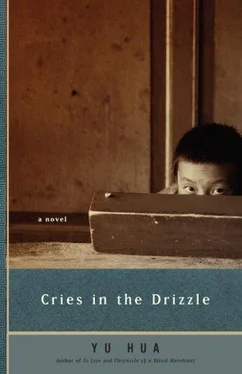My father ignored him, saying to my mother, “The old guy is giving himself airs. He wants me to bring him his dinner.”
Granddad gave another shout, “Sun Kwangtsai, my soul has left me! I'm dying!”
At this my father went over to the door and said to him, “How can you be dying when you can yell like that?”
My grandfather started crying, his sobs punctuated by indistinct words. “Son, your dad is dying. I don't know what it's like to die. I'm scared!”
Sun Kwangtsai had had enough of this. “I don't see there's anything the matter with you,” he pointed out.
Encouraged perhaps by his son's responsiveness, Sun Youyuan stirred himself to call, at even higher volume, “Son, I really have to die! You just get poorer with every day I live.”
The loudness of his delivery made my father uncomfortable, and he said with annoyance, “Keep it down, will you? If people hear that, they'll think I've been persecuting you.”
To my young mind, there was something unnerving about Sun Youyuan's premonition of death and his handling of this foreknowledge. It seems to me now that when Granddad sensed his soul leaving him, he must have genuinely felt that this was what had happened; surely he would not have concocted this story as some kind of subterfuge, when his own life and death were involved. But perhaps after he injured his back he had begun to plan for his own demise, and it may be that he magnified what was simply a normal physical reaction to his yelling at the sky, imagining it to mark the departure of his soul and a portent of his death. That afternoon when the sky cleared, as Sun Youyuan wept incessantly, he had already finalized his own sentence. For this old man in the twilight of life, there was no real choice to make when faced with the prospect of being reunited with his wife and departing forever from the world. For nine long years he had hesitated. Now, when he finally felt that death was inescapably approaching him, his tears demonstrated how tightly he still clung to this mortal life, despite all its hardships. His one request was that Sun Kwangtsai agree to make him a coffin and send him off with pipes and cymbals: “Make sure the pipes are blown good and loud, so the news carries to your ma.”
I was stunned by the idea that Granddad would just lie down and die. The image of him in my mind underwent a fundamental change. No longer did I think of him as someone who sat in the corner recalling his past, for now he was intimately connected to death itself. He became unutterably distant from me, fusing with the grandmother I barely remembered.
My little brother showed a compulsive interest in Granddads imminent passing. He stood by the door the whole afternoon, peeping at him through the crack and running outside from time to time to report to my big brother, “Not dead yet.”
He explained to Sun Guangping, “Granddad's belly is still moving.”
As far as my father was concerned, Sun Youyuan's resolve to die was just empty posturing. As he left the house with his hoe on his shoulder, he had the unpleasant feeling that Sun Youyuan had simply found a new way to give him a hard time. That evening, however, after we had eaten and Granddad had still not emerged from his room, my mother took a bowl of rice in to him and we heard him whine, “I'm dying. I'm not eating.”
Only then did my father take seriously Granddad's determination to die. With a look of surprise on his face he went into Granddad's room, and these two archenemies actually began talking to each other like devoted siblings. Sun Kwangtsai sat on Sun Youyuan's bed and talked to him in a good-natured tone that he had never used when speaking to him before. When he emerged, he was already convinced that his father would soon no longer be of this world. Beaming with joy, he made no effort to conceal his elation, indifferent to whether or not this would jeopardize his prospects of being seen as a proper son. He went out to spread the news that Sun Youyuan was about to die, and even from inside the house I could hear his ringing voice off in the distance. “How long can somebody live if they don't eat?”
Having lain in bed expectantly all night long, Sun Youyuan nimbly propped himself up the following morning when Sun Kwangtsai came in. “What about the coffin?” he asked.
It gave my father a shock to find that Sun Youyuan was not at his last gasp as he had been anticipating. He seemed a bit disappointed as he came out of the room, shaking his head and saying, “It looks like we're going to have to wait another couple of days. He still remembers about the coffin.”
My father was perhaps concerned that when the next mealtime came around Sun Youyuan would emerge all of a sudden and humbly take his seat among us. Sun Kwangtsai did not rule out this possibility at all, so he felt compelled to give proper attention to the coffin that so preoccupied Granddad. That morning he walked in with two blocks of wood in his hand and with an air of exaggerated mystery instructed my little brother to knock the bits of wood together. I was taken aback to see my father, usually so careless and blatant, suddenly so stealthy and furtive. Then he stood erect, shoved open Granddad's door, and said to him in the tone of a filial son, “Dad, I've got the carpenter here now.”
Through the half-open door I saw Granddad raise himself slightly and give a relieved smile. My little brother, who seldom performed any useful service, had now acquired a temporary occupation, and Sun Guangming brandished the two lengths of wood and knocked them together as though they were weapons in a lethal swordfight. But my little brother was a lover of freedom and could never accept space restrictions for very long. He soon became fully invested in these military operations and, like some general in ancient times, fought his way out of the house, perspiration pouring down his face. He had totally forgotten what his job was supposed to be, so carried away was he by the joy of fighting at close quarters. His wheezing war whoops gradually receded in the morning sunshine as he ran off who knows where, and he did not return until almost dinnertime, by which time his hands were empty. When my father asked him what he'd done with the pieces of wood, Sun Guangming looked baffled. He hemmed and hawed as though he had never seen them his entire life.
After my little brother disappeared, I heard a restive shout from my grandfather's gloomy room: “The coffin!”
With the silencing of the wood-tapping sounds that could appease his soul, a hungry rustle rasped in Sun Youyuan's flat and febrile voice. His last wish in life had been dashed by my little brother's insouciance.
Later it fell to me to carry on the construction of the bogus coffin. My older brother, fifteen by this time, saw this as quite beneath him. Sun Kwangtsai grabbed me by the shoulder, having realized all of a sudden that this morose son of his could occasionally do something worthwhile. As he passed me the blocks of wood his face was the very picture of disdain. “You can't just eat free meals all the time.”
For the next two days I gave grandfather the reassurance he sought by beating out a monotonous rhythm with the wooden blocks. But I found myself in a hopeless trough of despond. At thirteen I was sensitive enough to wonder whether I was hammering nails in my own coffin. Although Granddad had not offered me understanding or sympathy after my return to Southgate, because his status in the family was so like my own, when he gave an indication that he felt sorry for himself — as he was inclined to do — I considered, from my perspective, that his sentiments also contained an element of compassion for me. My disaffection with father and home was aggravated by the tapping sounds designed to hasten Granddad's death. Now, so many years later, I still feel that this was a cruel punishment for my father to impose on me, however unwittingly he may have done so. My sense at the time was that I was like a convict on death row who is forced to carry out the execution of another hapless inmate.
Читать дальше












